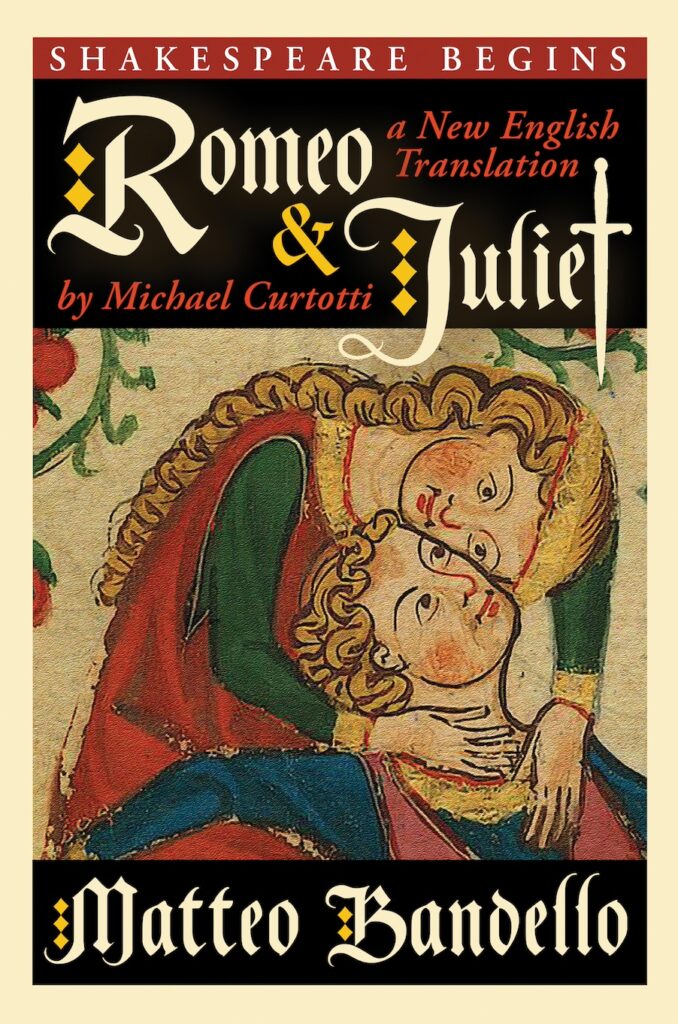Matteo Bandello’s Romeo and Juliet (English Edition)
A New English Translation by Michael Curtotti

This is Romeo and Juliet as you’ve never experienced it before…
By the time William Shakespeare penned the first words of the most famous romantic tragedy of our time, another storyteller had already written Romeo and Juliet. In fact, Matteo Bandello’s stories had been translated into multiple languages across Europe before the doomed lovers inspired Shakespeare to create his world-famous play.
In this edition, Bandello’s original tale has been translated and formatted for the modern reader. In contrast to Shakespearean English, Bandello's beautiful writing has a clarity and directness through which we hear, as never before, the words a real Romeo and Juliet might have said to each other. The star-crossed lovers we know are there, just as in the play, but their troubles are set in a real Verona, that Bandello knew personally.
As the tragedy unfolds to its bitter end, Bandello's heartrending story offers readers a more intimate experience of the anguish and joys that captured Shakespeare and an entire continent. Hidden for years in the ivory towers of scholarly study, Bandello’s influential tale finds new life in Michael Curtotti’s translation for students and lovers of literature alike.
This is the English language edition. A parallel English-Italian Edition is also available.
In praise of the author:
“ … the most celebrated novelist of the Italian Renaissance period …” John Payne
“Matteo Bandello … deserves to rank as the most important of the Italian novellieri … [By none] … of his contemporaries has the sheer craft of storytelling been shown more convincingly than by [Bandello] …” Percy Pinkerton
“… a true writer, prolific, polished, refined, and precise …” Leandro Alberti
Publisher: Aldila Press Pty Ltd (https://aldilapress.com)
Editors:
Cover Artists:
Translators:
Hins S. on Netgalley wrote:Phenomenal story. This is the version we should have been taught in school instead of Shakespeare's version. Don't get me wrong, Shakespeare's plays have their pros, but they are not meant to be read as a book. They're meant to be watched in play format. This version reads beautifully as a novella. There are some significant differences and I thought they made the story much better. The story is darker, more poignant, and delves deeper into their emotions and mental states. The speeches by both characters are also lovely and powerful. I will most definitely read this again whenever I'm looking for a Romeo and Juliet fix.
Megan R. on Netgalley wrote:This amazing translation by Michael Curtotti of the original “Romeo and Juliet” revives the nearly forgotten masterpiece of Matteo Bandello. In an age where we are more interested in authenticity and tracing thoughts and ideas back to their roots, and giving credits to the origins this translation comes to shed a light on the beauty of the original 16th century Italian novella that inspired the well known play of Shakespeare. Michael Curtotti's writing style is a harmonious blend of elegance and accessibility, making it a delightful experience for both seasoned literature enthusiasts, native English speakers, and readers from diverse linguistic backgrounds. His ability to convey the richness of Bandello's narrative in a way that resonates universally is a testament to the translator's remarkable skill.
Kelsey R. on Netgalley wrote:Since discovering Romeo and Juliet was based on a short story, I have wanted to discover it but never found one fully translated until today. Bandello's Romeo and Juliet is an amazing read that is a must-read that differs from Shakespeare's play in many ways that change scenes, and show how characters were supposed to be. Honestly, I enjoyed Michael Curtotti's translation of Bandello's story more than Shakespeare's play.
Overall, Bandello's Romeo and Juliet is a beautifully written story that shows where the star-crossed lovers' tale originated. If you love the play, I recommend you read Bandello's original short story.
Mimi C. on Netgalley wrote:I am someone who has never read this version of Romeo and Juliet before, but I found it completely compelling. I think I may even like this version of the story better than its more favorite Shakespearean counterpart. There is more depth and explanation to the characters and settings, and I think any fan of Romeo and Juliet should read this translation!
Romeo & Juliet, the tragic tale of two ill-fated young lovers succumbing to cruel and meaningless human rivalry, has captured the imagination of all sorts of creative minds for centuries, resulting in a multitude of adaptation in various mediums.
However, due to an abject lack of knowledge and disregard for the original source texts in popular history, I had attributed it to be solely the work of William Shakespeare.
Despite several clues, I was completely oblivious of the fact that this originally Italian tale has traversed oceans and countries and languages to finally land on English shores, which Shakespeare adapted for the London stage with his utmost brilliance.
In modern parlance this is what we would have perhaps referred to as adapted screenplay or dramatization for the stage.
The version of the story by Matteo Bandello, which has been translated by Curtotti here, is the text that Shakespeare seems to have followed for his adaptation.
Translation is a treacherous path to tread: capturing the essence of art created in a particular language by pouring it into the vessel of another, is a painstakingly arduous task that very few excel in.
Just by dint of the finesse, sophistication yet accessibility of the prose, one can easily gauge how wonderfully this task has been accomplished by Curtotti.However, this indeed is not just a work of translation, but a most fascinating and enriching read which provides meticulously analyzed act by act comparisons between Bandello's and Shakespeare's texts, a diligent mapping of character names used, long and detailed commentaries rooted in rigorous academic research along with copious amounts of footnotes elaborating on the historical contexts.
This needs to reach more people so that due credit can be bestowed upon the rightful brilliant minds spanning generations and nations whose collective genius have culminated in creating such timeless masterpieces.
I would urge you to read this if only to be filled with wonderment at how altered history and colonial prowess have successfully suppressed facts and blinded our collective consciousness.




